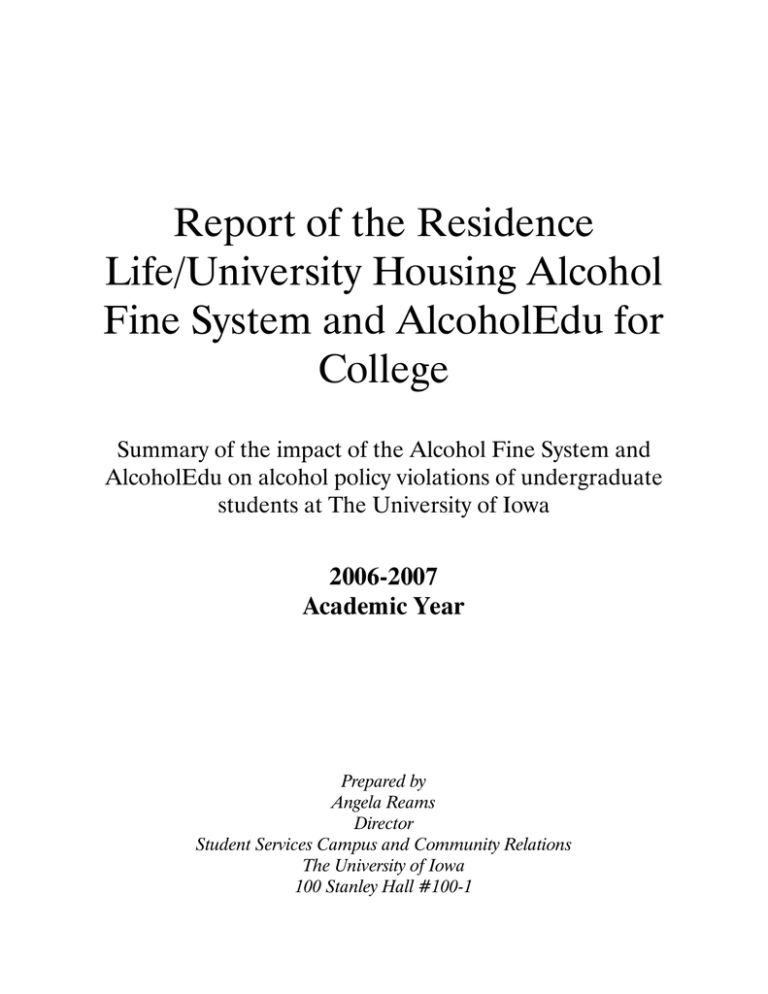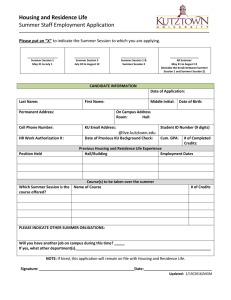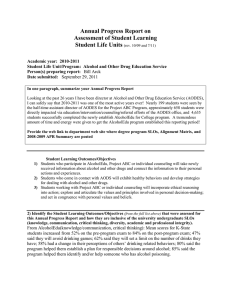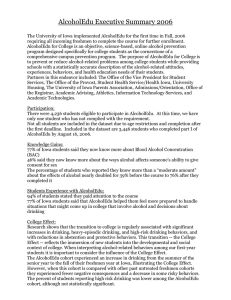Report of the Residence Life/University Housing Alcohol Fine System and AlcoholEdu for College
advertisement

Report of the Residence Life/University Housing Alcohol Fine System and AlcoholEdu for College Summary of the impact of the Alcohol Fine System and AlcoholEdu on alcohol policy violations of undergraduate students at The University of Iowa 2006-2007 Academic Year Prepared by Angela Reams Director Student Services Campus and Community Relations The University of Iowa 100 Stanley Hall #100-1 Summary Report of Residence Life/University Housing Alcohol Fine System and AlcoholEdu for College Purpose: The Alcohol Fine System was implemented starting Fall 2006 to address the normalization of high risk drinking on campus and the believed lack of impact at that time of receiving a residence hall alcohol violation. Resident Assistants and ARH members were questioned and stated that sanctions needed to be “felt” by the students. This system in conjunction with education and other tools the University already implements is meant to assist with behavior change concerning high risk drinking. It also provides an opportunity for reinvesting into the community by providing resources to maintain and improve the health and well-being of students within the residence halls. AlcoholEdu is an objective, science-based, online alcohol prevention program designed specifically for college students as the cornerstone of a comprehensive campus prevention program. The course is meant to prevent or reduce alcohol-related problems among college students while providing a statistically accurate description of the alcohol-related attitudes, experiences, behaviors, and health education needs of students. The main component UI students have requested through the years regarding changes to the high risk drinking environment was more education. AlcoholEdu challenges student perceptions and norms regarding alcohol consumption in college as well as motivates behavior change while providing the knowledge to make healthy decisions. Impact: The chart below shows the number and type of alcohol policy violations most common for undergraduate students at The University of Iowa during the 2005-2006 and 2006-2007 academic years. The chart compares Residence Hall and first year students to the entire UI population. UI Students cited by Police for PAULA on campus or off Campus 20052006 20062007 1086 620 Residence Hall Residents cited by non-police staff for Alcohol Possession in the Residence Halls 525 303 First-Year Students UI Students Arrested for Arrested for Public Public Intoxication Intoxication on campus or off on campus Campus or off Campus 411 390 First-Year Students Arrested for Public Intoxication More than Once 142 11 (all males) 187 15 (1 female; 2 students were three-time repeaters) The data in the chart above shows a decrease in overall PAULA violations as well as Residence Hall violations. There was also a decrease in the total number of Public Intoxication arrests, yet an increase in the number of first year students and repeat first year students’ arrests for intoxication. One of the main contributing factors for the increase in first year student intoxication arrests is believed to be the access and availability of alcohol to underage students in our community. The environment is a temptation rather than a deterrent by allowing underage students into alcohol venues. It is also known that it is difficult to employ protective factors, such as alternating alcohol and non-alcohol beverages, when in the environment due to the fact that non-alcohol beverages can cost equal to, if not more than, an alcohol beverage. When combining the College Effect, the increase in the prevalence of high risk drinking behaviors, with the Iowa City and UI environment, it makes it difficult to make healthy choices regarding alcohol consumption. AlcoholEdu data showed knowledge gains particularly in areas concerning blood alcohol concentration and understanding alcohol’s role in consent for sex. The AlcoholEdu data on high risk drinking was not statistically significant to show a change in the UI’s overall rate. AlcoholEdu data also showed a decrease in implementing protective factors and an increase in aggregate negative consequences experienced by first year students. Students did experience less hangovers and blackouts, though, when looking at separate negative consequences. This data reinforces what we know and believe about the environment’s affect on students’ behavior and choices. The Alcohol Fine System supported 124 educational programs, events, or activities that applied for specific funding for residence hall students in 2006-2007. The cost per program ranged from $30 to $700 spending a total of approximately $40,000. AlcoholEdu received a list of roughly 580 students who were interested in attending events, planning events, changing the social climate, and being involved with policy change in efforts to reduce norms and the harmful effects of high risk drinking. Anecdotally, students comment on lessons learned from AlcoholEdu, such as applying information regarding blood alcohol content to their situations, knowing the signs of alcohol poisoning, what binge drinking means, and understanding the role alcohol plays in relationships and sexual consent. Residence Hall students have stated that the fine system deters them from participating in illegal behavior in the residence halls and those who have received fines often state it is a motivator to change inappropriate and risky behavior. The contributing factors to the Iowa City/UI environment as well as the normalization of high risk drinking often make it difficult to attribute change to certain policies or programs. From the data above, though, it is safe to state that the Residence Life/University Housing Alcohol Fine System and AlcoholEdu for College are having an impact on students and high risk drinking, specifically possession under the legal age and drinking within the Residence Halls. Future Implications: The Alcohol Fine System and AlcoholEdu are in their second year of implementation at this time. It is imperative to continue to monitor the success, data, and impact of each throughout the remaining contract years of AlcoholEdu to note changes in behavior, violations, and knowledge regarding high risk drinking and consequences. It will also be important to research the impact of these programs if the legal age ordinance passes in Iowa City and creates a reduction in access and availability to alcohol.


